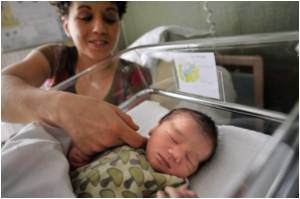During pregnancy a mother's body wants to produce a strong healthy baby but not at the expense of her own health.

"The imprinted genes derived from the father are greedy whilst those from the mother are conservative in their needs to ensure future reproductive success", said Dr. Miguel Constancia from the University of Cambridge, England. "We have found evidence that imprinted genes play important roles in the control of endocrine functions of the placenta. These placental adaptations have marked effects on nutrient delivery to the fetus, resulting in the programming of homeostatic mechanisms with metabolic consequences extending to adulthood, for example for type 2 diabetes susceptibility."
There is evidence that some programming effects are different in male and female offspring. Dr. Rachel Dakin from the University of Edinburgh, Scotland, shows how maternal obesity is associated with sex-specific programming effects in young adult mice. Female offspring of obese mothers had raised blood insulin levels, whilst male offspring did not. Male offspring did have alterations in the expression of liver genes important in lipid and glucocorticoid metabolism.
Professor Claudine Junien from the Institut National de Recherche Agronomique (INRA) in France says: "For me a gene, a cell and even a sex does not think and has no intelligent design. Instead it reacts to diverse environments and situations according to what its build-up can afford, pushing in one direction or another (or several at a time). The limits to which it can go without going awry or dying have been established progressively throughout the slow and long process of evolution, with different genetic backgrounds throughout the world depending on the diversity of experiences over the ages.
We have data showing that gene expression and DNA methylation are sexually dimorphic in male and female placentae under normal/control conditions. Surprisingly, in stressful conditions, such as a high fat diet or low calorie diet, or maternal overweight/obesity - the male and female placentae do not use the same strategies: they use different gene pathways and networks to cope with the stress.
Does this directly lead to different outcomes? It may lead to sex-dependent differences in the outcome of programming with long lasting effects. Alternatively, it may be that metaphorically speaking males climb the mountain taking the north face while females take the south face - but they ultimately reach the same peak after using these different paths."
Advertisement
Koletzko, who is also the Co-ordinator of the EARNEST project said, "This is a new and exciting area of research which suggests that some of the differences in disease risk seen in men and women in later life might be explained by different responses to programming effects in early life."
Advertisement
Source-Eurekalert
RAS









